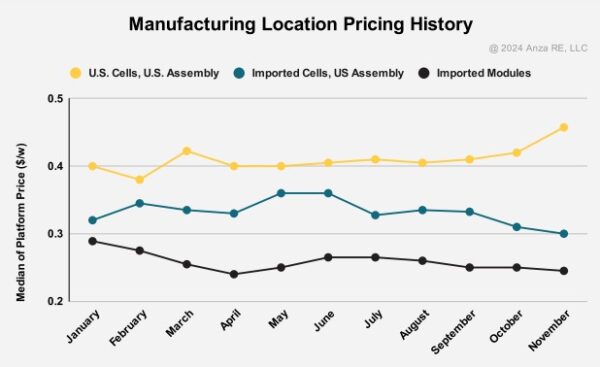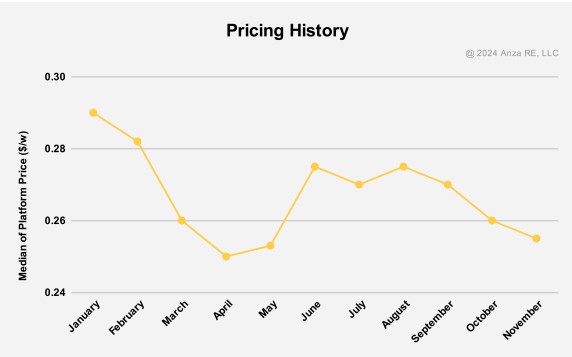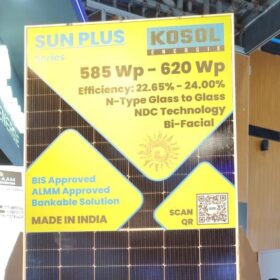From pv magazine USA
Since peaking in August, prices for solar modules for distributed generation (DG) projects such as rooftop, commercial, industrial, and community solar in the United States have declined by 7.3%, said a Q4 report from procurement platform provider Anza Renewables.
Anza said prices averaged $0.255 per watt in November, down from the summer high of $0.275 per watt. Module prices on Anza’s platform started 2024 around $0.29 per watt.
The pricing data is based on DG list prices from over 35 module vendors, equating to more than 95% of the U.S. module supply, said Anza.
The company attributed the declining pricing to an increase in U.S. solar manufacturing capacity and an oversupply of non-domestic modules imported in advance of upcoming antidumping and countervailing duty (AD/CVD) enforcement.
Anza noted there is a divergence between U.S.-produced solar cells, which are in-kdemand due to Inflation Reduction Act tax credits, and globally supplied solar cells, which are not eligible for the same credits.
Modules containing U.S.-produced cells have experienced a notable 13% price increase from August to November, as buyers prioritize these options to maximize incentives under the IRA, Anza said. Meanwhile, modules with imported cells declined 10.4% over the same period.

“These trends suggest that the market is increasingly differentiating module pricing based on the origin of both cell production and final assembly, as buyers seek to balance costs with the incentive advantages of domestic content,” Anza said.
The report noted that Tier-1 global module suppliers have experienced more price volatility than non-Tier 1 suppliers. Anza said the data suggests that AD/CVD duties have had a more pronounced effect on Tier-1 suppliers.
“Buyers may find opportunities in the current market dynamics, balancing cost considerations with the quality and reliability associated with Tier-1 modules,” the report said.
This content is protected by copyright and may not be reused. If you want to cooperate with us and would like to reuse some of our content, please contact: editors@pv-magazine.com.









By submitting this form you agree to pv magazine using your data for the purposes of publishing your comment.
Your personal data will only be disclosed or otherwise transmitted to third parties for the purposes of spam filtering or if this is necessary for technical maintenance of the website. Any other transfer to third parties will not take place unless this is justified on the basis of applicable data protection regulations or if pv magazine is legally obliged to do so.
You may revoke this consent at any time with effect for the future, in which case your personal data will be deleted immediately. Otherwise, your data will be deleted if pv magazine has processed your request or the purpose of data storage is fulfilled.
Further information on data privacy can be found in our Data Protection Policy.